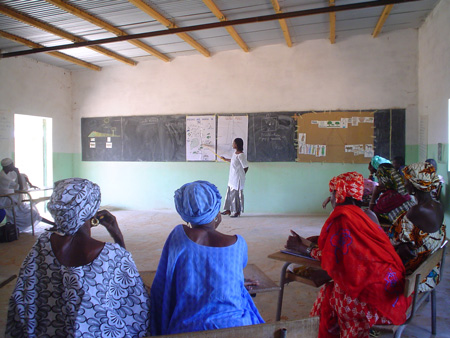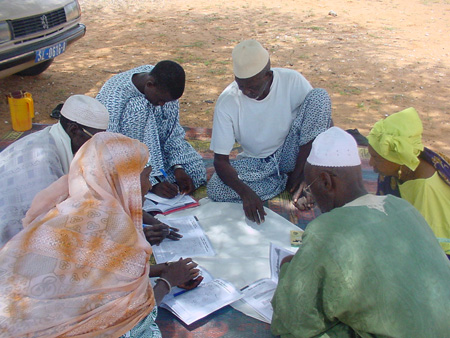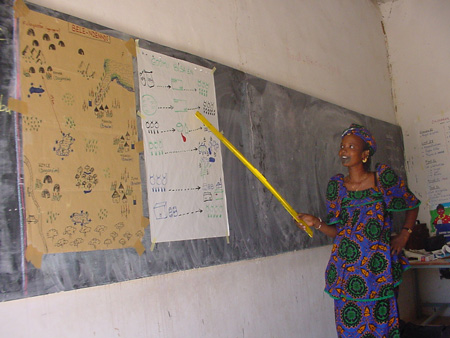Sénégal
Associates in Research & Education for Development - ARED
Country Profile
Population: 11 658 000 (2005)
Adult Litercy Rate: 39.3 % (2002)
Population below national poverty line: 33.4 % (1992)
National or official languages: French, Balanta-Ganja, Hassaniyya, Jola-Fonyi, Mandinka, Mandjak, Mankanya, Noon, Pulaar, Serer-Sine, Soninke, Wolof
Context
“We are fortunate to work in a context where the community sees the value of Pulaar literacy. However, our “gift” back to others is to demonstrate how the community can be involved, the importance of having culturally relevant materials (not just functional materials), how far a new literate can go in his or her learning after only a few hundred hours of training.”
It is important to note that Pulaar language literacy can be introduced into a community in such a way that the community becomes an actor in the process of defining the form, role and value of education. The key element in this process appears to be the cultural echo that education in Pulaar has found. In this context, the pursuit of education is no longer associated with cultural alienation (as is so often the case in formal education in French). Instead, education becomes something which can contribute to local development initiatives while still preserving the culture, thereby integrating new ideas into the existing social and intellectual systems.
ARED is dedicated to developing materials in African languages. However, the first language is Pulaar (also known as Fulfulde), which is spoken by more than 25 million people across the Sahel. The focus of ARED’s work is in northern Senegal, because of a very active grassroots initiative to promote literacy in Pulaar in that area. Materials are first written in Pulaar, in order to judge whether or not they match the needs and levels of new literates. However, once materials have been developed in Pulaar, they are adapted to other dialects of Fulfulde, other West African languages, or translated into French.
ARED also currently responds to requests from organizations in Senegal, Mali, Benin, Burkina Faso and Niger.

Programme
ARED is unique in Senegal in that it develops books meant to be used by other programmes rather than by ARED itself. The trainers train teachers for other organizations rather than teaching literacy themselves. ARED was created in 1990 in order to publish books for new literates, and help other programmes in their training activities. Since 1992, over 150 titles have been edited, 800,000 books sold, and more than 450 training courses carried out for more than 9,000 participants.
ARED does not implement literacy programmes of its own in the field, but instead responds to requests for training courses and books from local associations, other NGOs, bi-lateral projects, etc. The intention is to go beyond basic and functional literacy materials by providing very complex materials on local laws, the impact of development projects, the development of a civil society, etc. — as well as providing good reading materials in the form of novels, poetry, history and local knowledge.
ARED programmes provide participatory, learner-centred education in African languages to both individual learners and local communities. The programmes focus on developing basic literacy skills, leadership and organizational capacities, as well as providing information on citizenship and civil society so that people can make informed choices, allowing them to reach their own goals through increased access to education and information. It also provides some of the necessary tools for mastery and change at the community level by continuously developing curricula which address the tasks that all adults have before them — be they leaders, decision-makers, elected officials, groups advocating for change, or simply citizens who are trying to meet the needs of their families. ARED is also one of the few editors in West Africa that publishes books that encourage reading for pleasure, so that new readers can identify with the story and the characters, rather than just seeing reading as a way of learning something new.
Training activities vary in length (from 20 to 100 hours each) and are carried out in local communities, both rural and peri-urban. Although every training activity is accompanied by a book in the language in which the course is being held, it is not assumed that everybody attending the training courses will be literate. There is a deliberate attempt to bring together a mix of community members including youth aged from 15 to 30 years and adults from 30 to 70, men and women, literate community members and those who do not know how to read and write. Since classes are learner-centred, they depend on the knowledge and exchanges between participants, and this mix of participants is crucial for both the sharing and the storing of information.
ARED is looking for ways to incorporate marginalised groups into an educational process which meets their particular needs as busy working adults. These groups include:
- Adolescents who have not had the opportunity to start or complete primary school education. ARED strives to provide this group with “basic education” (which could be equivalent to, but is not limited to, primary school education);
- Women who have not been able to attend official school systems, and whose busy working lives do not permit them to attend formal school on a systematic basis;
- Ethnic groups, occupational groups and language groups who are often marginalised when decisions are made which should include them as part of the community; and
- Community organisers and leaders who need to be better prepared to assume their role as leaders.

ARED has already tested and developed training courses and materials on a variety of topics. Community associations can freely choose the topics that best meet their needs. All of the topics listed below include one or more books in the local language. The existing topics include:
- Literacy & maths skills — This requires local literacy teachers to take three courses, each lasting 90 hours. These teachers then go on to teach a minimum of one 300-hour programme in their communities.
- Negotiated conflict resolution — This is a 100 hour training course on how to identify and analyse conflicts (especially those between herders and farmers in the Sahel), and achieve a win-win outcome. It also includes a full presentation of the process of mediation.
- Civil society — ARED has developed several modules lasting 35 to 70 hours each to reinforce the role of civil society, especially in rural and/or poor areas of Senegal. These include an explanation of the land tenure law, the forestry code, the new rural code, the role of locally elected officials, the rights and responsibilities of citizens and the role of the three branches of government.
- Participatory analysis of local conditions — This visual method, originally referred to in English as the “rapid rural appraisal”, is now more commonly known as the “participatory rural analysis”, is a means of bringing together community groups to analyse various issues of importance. ARED has several training courses lasting 35 to 70 hours each to help groups work together to study environmental issues, learn about the interaction of families and the community, investigate livelihood sources, etc.
- Organization building — In the rural Sahel today, hundreds of local associations are being created to address community issues. To support this process, several training courses of 35 to 70 hours each have been developed, helping community groups learn how to create an association, identify the legal implications involved, write budgets, and manage and run a community centre, etc.
- Pastoralism — This is a 100-hour training course covering the most urgent aspects of herding in the Sahel today, including an analysis of the existing system of herding, concepts underpinning development projects and legislation from all of the Sahelian countries.
- HIV/AIDS — While many HIV/AIDS programmes focus on the disease itself, and/or the care of those who are suffering from it, ARED has a 35-hour training course which focuses on how to bring community members together to discuss the social practices which ignore or promote the spread of the disease, and identify ways in which community groups can start working together to face their social responsibilities.
- Culture, literature and indigenous knowledge — For a person to develop fully, it is crucial that the value of their own cultural knowledge systems receive officially recognition. ARED offers 20-hour training courses to enable the publication of 25 books comprising works of literature, historical accounts, overviews of local knowledge systems, etc.
ARED is continuously looking to establish good partnerships. It is this network of like-minded individuals that allows ARED to strengthen its capacity, reach more learners and be more productive.

Lessons learned
The key to ARED’s success lies in the link that it has forged between cultural identity and literacy. Because training course participants become more knowledgeable citizens and are better able to work together, they are in a position to play a key role in their communities. They may join and contribute to a community association or lobby for interests that are all too often ignored. Alternatively, they may succeed in making voices of marginalised people, such as women, heard in community groups.
What is striking is that participants do not view literacy classes or training courses as a set of mechanical skills or information that must be learned, but rather as a process of empowerment made possible by the exchange between participants, and between the self and the written word.
ARED continues to work to achieve two goals. The first is to identify issues of importance to local communities and find a way to present these issues to all members of the community who have, or will have, a voice in the decision-making process. The second is to provide good reading materials so that new learners have something to read that brings them pleasure.
Contact:
Sonja Fagerberg-Diallo
NINEA 006 3 719
Villa 3074 Amitié 1
BP 10 737
Dakar - Liberté
Sénégal
ared@enda.sn

 Homepage
Homepage